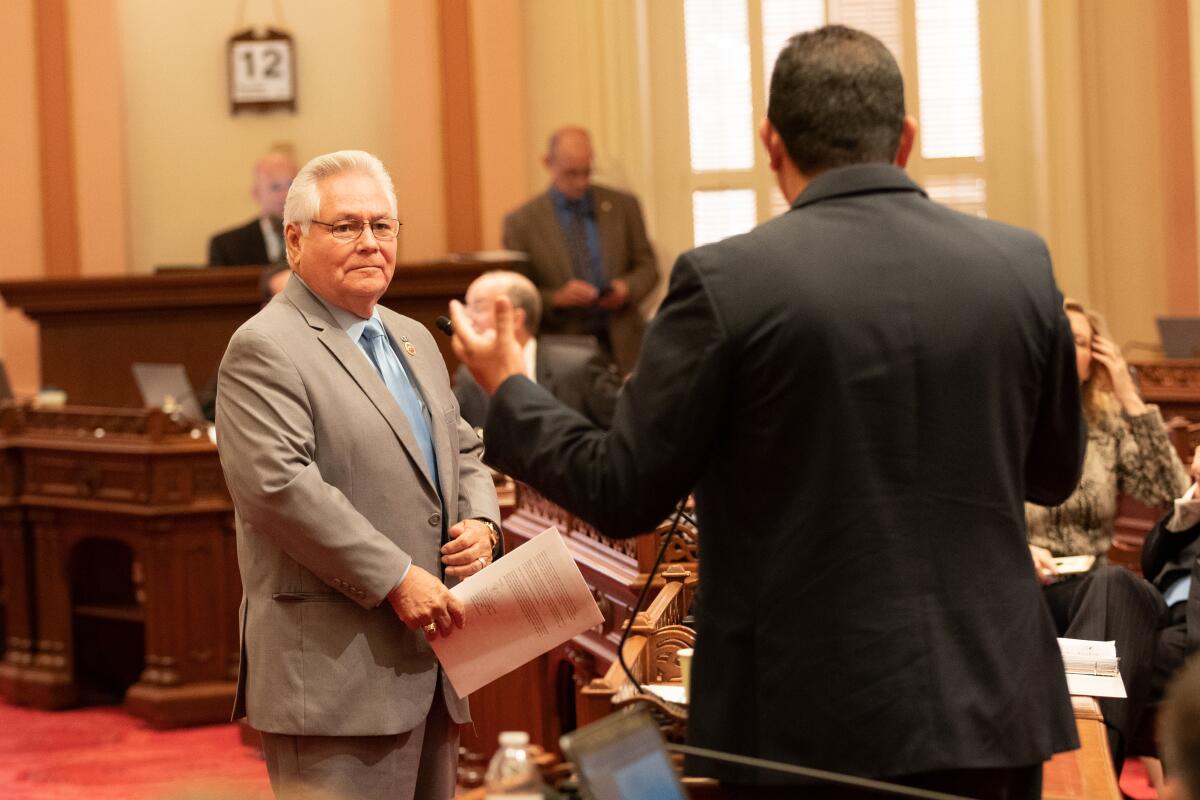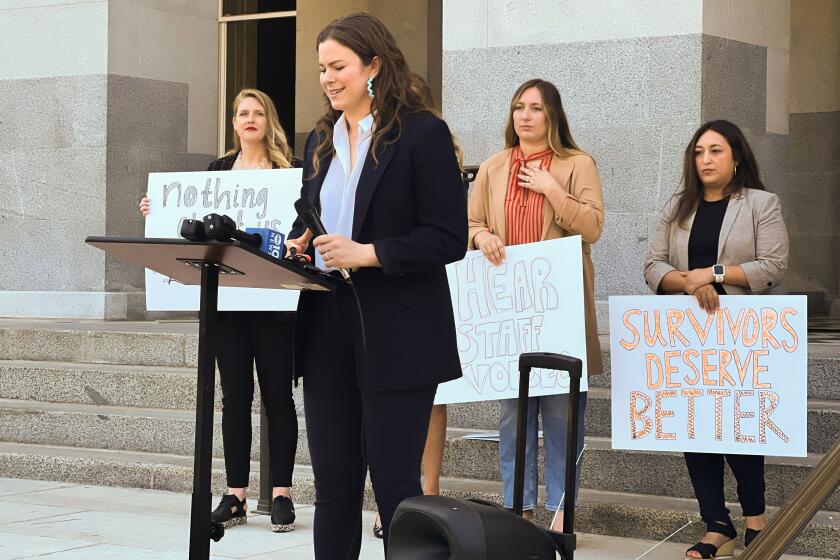Former legislative staffer who sued state Senate wants changes to Capitol misconduct unit

- Share via
SACRAMENTO — A little over a year after the #MeToo movement first jolted the California Capitol with extensive allegations of sexual harassment in the statehouse, legislative leaders responded by launching the Workplace Conduct Unit, an independent panel charged with investigating complaints of inappropriate behavior in the Legislature.
The unit is now at the center of a sexual harassment and retaliation lawsuit that a former employee filed last year against the state Senate, her former boss Sen. Bob Archuleta (D-Pico Rivera), his chief of staff and the Senate Rules Committee.
The former staffer, identified as “Jane Doe” in the lawsuit, resigned from the Senate in September 2020. After months of litigation, the upper house recently offered Doe her job back and proposed a settlement agreement.
On Friday, Doe’s attorney, William Reed, sent a response letter to the Senate’s attorneys listing a series of proposed changes to the unit as conditions for considering Doe’s reinstatement.
The nine-page letter demands the removal of certain human resources personnel and for steps to be taken to increase transparency and independence within the unit.
In a statement, Secretary of the Senate Erika Contreras said that the Senate offered a job with protections back to Doe “in good faith.”
“We have offered Mr. Reed’s client a safe path back to work she loved, and instead he has responded with a set of extreme ‘poison pill’ demands designed to look like his client is interested in returning to work when in fact either he or she does not want that to happen,” Contreras said.
The Workplace Conduct Unit was set up after the #MeToo movement in California’s Capitol, but advocates and staffers said major concerns remain.
The lawsuit, filed in March 2021 in Los Angeles County Superior Court, alleged that while Doe worked as Archuleta’s district director in 2019, he made inappropriate and unwelcome comments to Doe and initiated “unwanted romantic propositions.” The lawsuit claimed that after Doe “refused his advances,” Archuleta publicly embarrassed and retaliated against her, and that her role was “vastly minimized.”
Archuleta did not respond to a request for comment, but he has previously denied the allegations.
The complaint also alleged that Doe’s concerns went unaddressed by mandated reporters, leaving her with “no choice” but to resign in September 2020 after more than a decade working for the Legislature. The Workplace Conduct Unit was added as a defendant in the lawsuit in July 2021. The complaint alleged that the unit “failed to carry out in a timely manner” an inquiry into her allegations.
The Senate proposed an “unconditional offer of reemployment” to Doe in a June 16 letter that promised she would be rehired in a similar role working for another senator with the same salary and benefits.
In a separate legal document, the Senate offered Doe $250,000 to settle the lawsuit without requiring the defendants to admit liability. The proposal to reinstate Doe to her former position is not conditional on accepting the settlement offer, the Senate’s attorneys wrote.
Reed wrote that Doe would consider taking her job back only if the Workplace Conduct Unit’s investigative process was improved and if she received a public apology from the Senate and Archuleta. Doe did not respond to the offer to settle the lawsuit.
Doe also requested that Contreras and Julia Johnson, the Workplace Conduct Unit’s former executive director, “step down.” Johnson announced earlier this year that she had resigned and was accepting a position at another state agency.
Lawyers for the state Senate have argued in court records that Doe “repeatedly tried to prevent an investigation from taking place,” and that the COVID-19 pandemic also impeded a formal probe into the alleged misconduct.
“Ultimately, [Doe] refused to cooperate with the Workplace Conduct Unit investigation and thus prevented an effective investigation from taking place,” one of the court filings stated. “The Workplace Conduct Unit attempted to initiate an investigation; however, that investigation was impeded by plaintiff’s refusal to cooperate.”
Doe’s attorney denied those allegations.
The concerns raised in the lawsuit echo other criticism the Workplace Conduct Unit has faced in recent months. A coalition of former staffers and women’s advocacy groups called on the Legislature in June to hold a public hearing on the successes and failures of the panel, and to accept changes they’ve said are necessary to hold alleged perpetrators accountable.
The coalition sees a revamp of the Workplace Conduct Unit as a way to fulfill promises made during the #MeToo movement, which started in October 2017 when more than 140 women — including lawmakers, staffers and lobbyists — wrote a letter describing a culture of rampant tolerance of inappropriate behavior in the Capitol and calling for changes in policy.
Less than a year after the letter was published, three lawmakers who faced public accusations of misconduct had resigned and a fourth left the Legislature, citing health reasons, while he was the subject of another investigation.
Assembly Speaker Anthony Rendon (D-Lakewood) and Senate President Pro Tem Toni Atkins (D-San Diego) recently said they would have discussions with the Legislative Women’s Caucus to determine what improvements to the Workplace Conduct Unit were needed.
They said they would implement the recommendations by the end of the legislative session in August. The unit has resolved 95% of the 349 complaints it received between February 2019 and 2022, the legislative leaders said.
Micha Star Liberty, a California attorney who has represented current and former employees in the Legislature, said the Workplace Conduct Unit’s current process to review complaints deserves scrutiny, especially around investigation delays and transparency.
“I would hope that the Legislature would engage in a good-faith negotiation, not just with [Doe], but on a wholesale scale where every worker has access to a prompt, independent and productive process to resolve employment issues,” Liberty said.
Reed said the negotiations are an effort to “effectuate change” and “make sure that if Jane Doe were to consider returning, she would return to a safe work environment.”
More to Read
Sign up for Essential California
The most important California stories and recommendations in your inbox every morning.
You may occasionally receive promotional content from the Los Angeles Times.












